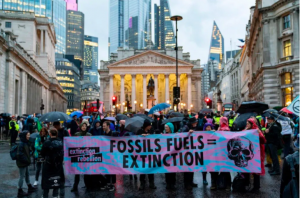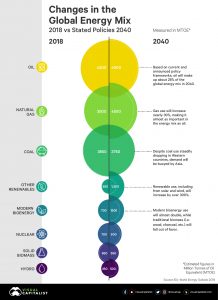Chloé Bazin

Figure 1: Extinction Rebellion activists protest against institutions funding ecological destruction on October 14th 2019
As our planet’s resources are running out, we are on the verge of a global energy transition. The oil and gas industry now faces more opposition than ever and stands at a crossroads. How are those who contributed the most to climate change helping to solve the problems they have created?
An uncertain climate for fossil fuel companies
Most of us would say fossil fuel companies are on the wrong side of history. Many even have strong feelings of anger and hate towards them. You might have seen news of environmental activists protesting by smashing windows or gluing themselves to an oil company’s building entrance, chanting “keep it in the ground!”. What did the oil industry do to make us so angry at them? Is the climate crisis just their fault? To understand the context, let’s first look at some facts.
The growing use of fossil fuels in the last century enabled transformative technologies and modernisation of societies in many countries around the world. The predominant perspective that peaked in the 1950s was that nature’s resources were available at the service of economic, social and medical progress. However, today, we have scientific evidence that extracting and producing oil and gas contributes to 9% of all human-made greenhouse-gas emissions (GHG) globally, and with the fuels used in cars and planes, the total of GHG accounts for more than one third of global emissions. Therefore it is little surprise that climate activists are putting enormous pressure on the oil and gas sector. This may seem extreme to some, but they firmly believe these companies hold the key to turn the current climate crisis around.
A low-carbon transition precedes the energy transition
However, is it realistic that activists are fighting these industries to stop today? Cutting off fossil fuels from the energy mix from one day to the other is not that simple. It would mean the current COVID-19 situation continuing as the new normal, and likely much worse. There would be no transportation: no cars, no trains, no planes, no ships. Long-term global economic slowdown would be inevitable. This is because our current energy system is highly carbon-intensive, with coal, oil and gas providing 85% of all energy we use globally. For example, fossil fuels provide 61% of electricity today in the US. On top of this, our global energy demand is estimated to grow by more than 50%, driven by urbanisation, industrialisation and a growing global middle class. It follows that we cannot fully remove fossil fuels from the mix instantly. The industry therefore faces a major challenge: how can it respond to activist pressures to decarbonize fully while keeping a societal license to operate, ensuring a stable energy transition, as well as providing for some of the expected global energy demand, until the necessary infrastructure is in place for alternative solutions? The fossil fuel industry’s response to this tension could be reconsidered as an opportunity for change.
Realistically speaking, in order to transition quickly to a renewable energy system or an instant lower carbon economy, we need to make sure that growing energy needs around the world continue to be met while switching as fast as we can to low carbon. The oil and gas sector has started implementing some low-carbon activities, for example trying to diversify its energy harvesting methods. Shell for example is attempting to invest into green energy by buying up small firms like Greenlots (making fast electric vehicle charging stations) or installing large-scale solar farms. However these investments constitute such a small part of their total budget (only 2 to 3%) and therefore do not display a firm commitment to the energy transformation. It is offering carbon offsetting schemes that include announcing reforestation plans and biodiversity conservation projects. This seems like paid lip services, as does the public announcement that Shell will align with the goals of the Paris climate agreement. In fact carbon offsets should only be used as a last resort – the first step should be to reduce emissions.
A transformation of global policies on the path to net zero
Meeting the growing energy needs with reduced fossil fuel usage requires a complex set of actions including lowering CO2 emissions, rapidly increasing support for sustainable energy sources together with a focus on energy efficiency and productivity.

Figure 2: Changes in the Global Energy Mix in 2018 vs 2040
But if we continue with business as usual and develop new policies only in the margin, fossil fuels will continue to provide the majority of our energy mix until 2040. As we can see in Figure 2, current predictions, based on the continuation of current policies, expect a decrease in coal usage, a small but yet an increase for oil consumption and substantial growth for natural gas. Reducing emissions therefore demands a transformation of policies and interventions: smart global policies to reduce emissions from fossil fuel powerplants, renewable energy harvesting methods and innovative decarbonization technologies. While solar and wind energy will grow by 300%, it represents a very small portion of the energy mix in 2040. We need many more large-scale decarbonization projects, like Climeworks, or effective decarbonization methods like Carbon Capture and Sequestration (CCS). The latter closes the carbon-cycle by capturing CO2 in the air and storing it in natural carbon sinks like plants and oceans or converting it into CO2-based products. Coupled with bioenergy, CCS can also offset residual fossil fuel emissions to make “negative emissions”.
New low-emitting technologies require large scale investments and subsidies. In 2017, the world subsidized fossil fuels by $5.2 trillion, equal to roughly 6.5 percent of global GDP. That’s up half a trillion dollars from 2015, according to the IMF. Redirecting fossil fuel subsidies towards these innovations, together with rapidly reducing and ultimately eliminating the use of fossil fuels, could be a more effective way to reach zero emissions by 2050.
In conclusion, the fossil fuel industry is a large contributor to the climate crisis but it could also play a role as a transformer and change maker. It has the money and the means to invest in new technologies to move towards low-carbon energy production. But the industry needs to seek change both from within (shareholders) and with external support (governments and investors) to move into action by implementing long term sustainable innovations. The current COVID-19 crisis could lead to an acceleration of events, as it is making more people aware of the possibilities of a true paradigm shift. As a result activists’ pressure on the fossil fuel industry may well go mainstream and become a major push for the industry to move faster and transform itself. The industry is clearly on the wrong side of history, but given their power in the current economy, it still has the choice to take another route at the crossroads they are standing at before it is too late.
References Websites:
https://nymag.com/intelligencer/2020/03/shell-climate-change.html
References Picture:
https://www.visualcapitalist.com/the-worlds-projected-energy-mix-2018-2040/ (visited 06.04.2020)
https://rebellion.earth/2019/10/14/extinction-rebellion-target-institutions-funding-ecological-destruction-in-city-of-london/ (visited 06.04.2020) (visited 06.04.2020)
Media Attributions
- XRFOSSILFUELS
- global-energy-mix-infographic